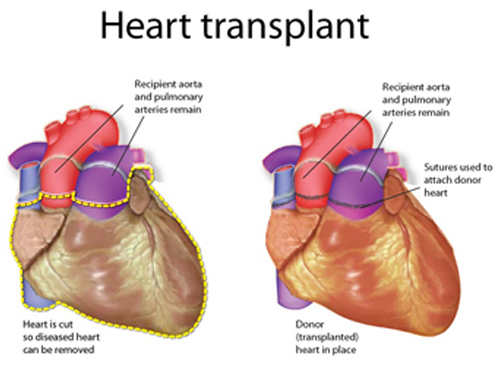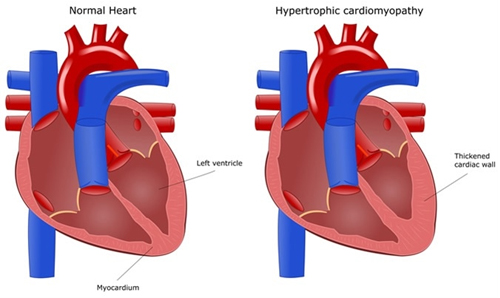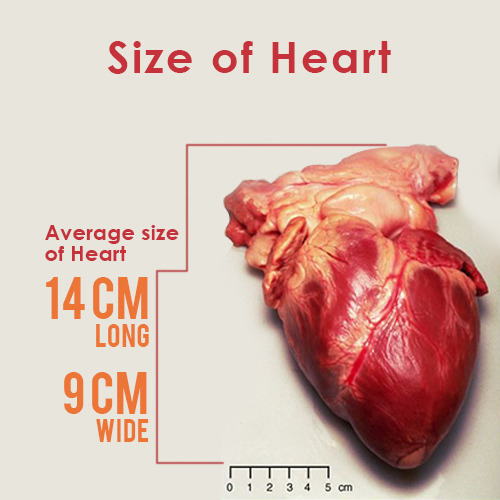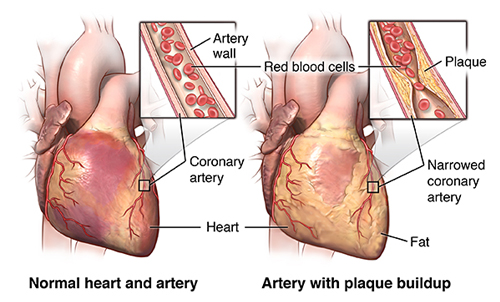Obviously human heart is a part of the human body which has a very important function. Without the presence of heart function, humans cannot live. This is in accordance with the function of the heart to pump oxygen throughout the human body. For that, it is very important for us to always maintain heart health. The trick is to always maintain a healthy diet and exercise diligently and avoid a bad lifestyle. That way the heart and other organs in the body can stay healthy and survive for a long time. However, of course the practice of maintaining the health of the heart and other body organs is not as easy as it is discussed. Many temptations make humans difficult to maintain health. Finally, the disease cannot be avoided and in the worst situation it will lead to heart transplant.

Heart problem symptoms and diseases that lurks in the heart is certainly a lot. And all cannot be ignored. A diseased heart can end in death. Plus the heart can experience heart failure which can occur anytime and anywhere. If you have been affected by heart disease, the lifestyle must be completely changed and they need heart failure treatment. Food must be taken care of, taking medication must be regular, and also should not forget small exercises such as walking in the morning. If you are already in a severe condition, heart disease patients should get medical measures such as surgery to heart replacement surgery.
Understanding of Heart Transplant Surgery
We must have often heard about certain organ transplant operations. So the organs that are unable to function properly are replaced by donor organs, which are of course still in good condition. Usually we find donor organs for the kidneys. However, surgery like this can also occur in the heart. Heart transplant surgery is an invasive surgical procedure performed to replace a diseased heart with a healthy heart donor. The aim is definitely to prolong the life of heart failure patients, which can be caused by coronary heart disease, heart valve disease, congenital heart defects, and cardiomyopathy.

Of course before surgery, a thorough examination is first done. This examination must be done to find out whether the heart donor that will be given to the patient is suitable or not. If it is not suitable, it will be dangerous for the patient’s body too. This examination is done to find out whether this patient is physically and mentally healthy to undergo heart transplant surgery. Age factors and health conditions must be taken seriously to weigh the good and bad actions. If the candidate matches, it will be placed on the heart donor waiting list. If the patient is not suitable, then another option will be given in the treatment of a diseased heart conditions.
When will a heart transplant be considered in heart hospital? When all the choices have been tried but still fail to improve the patient’s condition for the better. Usually this heart transplant option will be given to heart failure patients with conditions of coronary heart disease, heart valves, cardiomyopathy, congenital heart defects, and heart transplant failure if they have done it before. Indeed, heart failure can affect anyone of all ages. As for adult patients who have undergone such misfortune in their childhood, one day may also need a heart transplant. Usually patients with this background become congested and affect blood flow seriously.
Patient Criteria for Heart Transplant Surgery
Surely not just anyone can get a heart transplant surgery. Need to be examined in detail and in depth before a decision is made to perform a heart transplant process. Patients who are considered ineligible are if,
- Age 65 or older, the main reason of this is because people with the age of 65 or older have minimal chance on surviving heart transplant surgery. Additionally, even though it feels harsh having a heart transplant will be much more effective for people who have more hope to life especially for younger people that are in need of heart transplant because the organ are rare and heart matters a lot for many people.
- Have a medical history involving cancer, just as old age, people who have suffer from medical history such as cancer will have lower life expectation to be able to withstand the pressure of heart transplant. This will be a waste of the rare heart resource for the transplant itself which is why many people who have cancer will be denied of having heart transplant as it will be dangerous for their life
- Smoking and consuming alcohol regularly, people who are smoking and consuming alcohol in a high dose, then, it will make them ineligible to have the chance to get a heart transplant surgery as it will make the heart that are going to be transplanted to be go waste. This is possible to happen because usually people who have smoking and alcoholic tendency tends to have bad body condition which makes the heart harder to adapt. And heart have trouble to adapt to most healthy body which makes it impossible to adapt to body that have bad condition due to smoking and alcoholism
- Having other diseases that can affect their likelihood of surviving even after undergoing a heart transplant, having this kinds of diseases of course will surely to lower the life expectancy of the person who are going to have heart transplant on the first place. Therefore, this kinds if patient will have lower chance to be able to have heart transplant surgery on the first place.
- Have blockages in the arteries of the arms and legs, it means that the heart that will be transplanted will not be able to function properly, which means that it will be a waste of resource especially the heart itself.
- Have HIV infection
- Malnutrition
- Have pulmonary hypertension (thickening of blood vessels in the lungs)
- Have a disease involving the nerves, lungs, kidneys, or liver
If a heart disease patient has the characteristics above, it is certain that he cannot get a heart transplant surgery. Because it returns to the main goal of heart transplant surgery, which is to prolong the life of the patient. So it must be considered also some aspects of patient health. It is expected that from a heart transplant, the patient’s life can be extended even though he has not recovered as much as 100%. About 80% of people who get this action are alive and well for about two years after surgery, and about 70% are still alive for five years. The biggest and worst risk that can occur is that the patient’s body rejects the new transplanted heart.
Heart Grafting Process
So what is the process of heart transplant so far? Heart transplant surgery is one of the major invasive surgical procedures. Of course the preparation needed is quite long and not arbitrary. Patients will usually begin to be prepared several weeks or months before surgery. After the doctor has received a recommendation for a heart transplant, the patient will immediately be referred to the heart transplant centre to evaluate whether he is eligible. This evaluation action is important to find out if the graft is really the best treatment option. At the same time to find out whether the patient is physically, emotionally, and mentally ready to undergo whatever is needed in this heart transplant surgery.
If the patient has been declared eligible for a heart transplant, then he will be placed on the waiting list and the condition will be monitored continuously. If during this waiting period the patient experiences something that affects his ability to receive a graft, then he will be removed from the waiting list. Therefore it is very important to maintain the patient’s condition during this waiting list. While waiting for donors, mechanical heart aids such as ventricular assist devices (VADS) will be used to strengthen the heart and support the lives of temporary patients. To find out whether the grafted heart is suitable or not, a number of factors will be considered below:
-
Blood Group
Blood Group will be the main guide on deciding if a patient are eligible and also have high synchronization with the heart organ that will be transplanted. Expert will usually choose a heart organ from the donor that have the same blood group in order to improve the probability of successful heart transplant on the first place. As heart from donor with different blood group usually have lower chance to have better and successful heart transplant.
-
The Size of The Donor Heart
The size of the heart will also important in determining the success chance of a heart transplant surgery. The important part is that every human being have different body cavity especially for their heart organ inside their body. Therefore, it is important to choose a heart organ that are suitable with the previous organ. The similar the size the better as it will make the target body to be able to adapt with the new heart organ and make the heart organ works properly and have normal heart rate variability.

-
Recipient’s Medical Needs
The more severe the condition of the person who needs the heart transplant surgery, then they are going to be the first one that will receive the heart transplant organ first. It is important to know because life is important and medical faculty will organizing the heart transplant surgery based on the recipient medical needs.
-
Patient that Has Become the Waiting List Recipient
People who already have a waiting list will also be the first one to consider if compared by people who are just only need the heart transplant on the first place. Just like normal life, there are also queue on heart transplant surgery procedure.
-
Receiver Antibodies
The patient will also need to be check up on their antibodies level. This is to make sure that the surgery will be successful and will have no problem during the process on the first place.
Keep in mind that the heart to be donated can only be used for transplantation within four hours after being removed from a newly deceased patient. Usually, the donor heart will be taken to a transplant centre near the original hospital. So that patients on the waiting list will be informed that there is already a donor heart ready.
Usually heart transplant surgery begins with the removal of a sick patient’s heart by making a cross section of the main pulmonary artery, the aorta, and the superior and inferior vena cava. Then, the left atrium is divided by leaving the back wall of the left atrium and the open pulmonary vessels. After that, the diseased heart is removed. Later the heart surgeon will connect the heart donors to the patient’s body by sewing the veins, cava, aorta, pulmonary arteries and left atrium.

When the new heart is sewn into position and starts beating, the patient will be removed from the heart-lung machine. In some cases, the new heart will beat along with the entry of blood into the heart. But sometimes electric shocks are needed to stimulate the appearance of a heartbeat. After the operation is complete, the patient will be placed in the ICU. Then the patient will continue to be monitored regularly and given painkillers. Usually patients will be equipped with drainage tubes to eliminate the production of fluid from a hole in the chest.
Next is the healing process after heart transplant surgery. Usually for most people it will take a long time. After the first or second day of the procedure, the patient will be transferred from the ICU. But patients must remain hospitalized for approximately 1-3 weeks depending on the condition of the body during this healing period. The patient will then be monitored to find out if there is an infection that attacks and when the treatment procedure will begin. Anti-rejection treatment is very crucial to do to find out whether the patient’s body does not reject the presence of new organs. Usually the patient will be placed in a cardiac rehabilitation unit that is able to help adjust to the new organ.
After the heart transplant process, the patient still has to do a routine check with the doctor. Examination or follow-up is important for long-term healing of patients. Usually the medical team will do a blood test, heart biopsy through a catheterization, and echocardiogram after the surgery. The goal is to know and ascertain whether the heart is still functioning and have normal heart rate zones.
Complications and Risk of a Heart Graft
Surely this major surgical procedure such as a heart transplant will not be free from the risk of complications. This heart transplant still has a moderate risk of complications, including people who use all types of anaesthesia. As for the various complications and risks that may occur during the surgical process and graft actions include:
- Clots of blood
- Wound infection
- Kidney or liver damage occurs
- Cancer due to the use of drugs to prevent organ rejection
- Heart attack or stroke
- There is a problem with the heart rhythm
- High cholesterol levels, diabetes and bone thinning
- Rejection of the donor heart
- Bleeding
- Coronary heart disease
Heart transplant surgery has a good purpose to prolong one’s life. But there is no denying that this one medical procedure is very risky. The main risk is that the body will reject the donor heart. This rejection occurs because the immune system can regard the new heart as a foreign object that does not belong to the patient’s body. Eventually the immune system tries to ensure that the donor heart is part of the body. To prevent this risk, the patient will be asked to take immunosuppressant drugs. About 25% of heart transplant patients are usually still alive without experiencing signs of rejection. Even one year after surgery.
Usually a biopsy will be performed to find out whether the body rejects the donor heart or not. Signs of this rejection include:
- Hard to breathe
- Weight gain
- fever
- fatigue
- As well as problems with urine
During this adjustment period, it is very important for patients to always report changes that occur to the team of doctors. The function of the heart must be monitored continuously. After one year of carrying out a heart transplant, the patient is still obliged to watch the heart. For female patients who are in the fertile period, it is mandatory to consult a cardiologist before deciding to become pregnant. Pregnancy is safe for almost everyone who has a heart transplant. This was previously explained by an organ of the heart at the University of Michigan. But of course women who experience cardiac dysfunction or have had heart transplant surgery before still have a risk of abnormal complications for their pregnancy and a high risk of rejection of new organs.
Life Expectancy for Heart Graft Patients
Patients who receive heart donors will feel an improvement in quality of life. But of course the patient must keep the heart well. In addition to the consumption of anti-rejection drugs, patients also must continue to diet and a healthy lifestyle. Patients are obliged to consult with this doctor. Life patterns that will be determined such as not consuming cigarettes and exercising regularly according to the ability of the patient’s body to adapt with his/her new heart organ.
Generally the safety figure after performing the process of heart transplant surgery depends on the state of health. But the average number of heart transplant patients is still high. Although in fact for the long term in general its safety is still low, but still encouraging. As long as there is no rejection from the body of the transplanted organ, then at least the patient can still live healthy for the next few years.
This heart transplant surgery will certainly require a large cost. Besides patience which is certainly needed because waiting for the donor heart must be long enough and cannot be obtained in a short time. Not to mention if the available heart donor does not match the patient’s condition. Of course, the patient must be more patient to find the donor’s condition that is appropriate to his body.
Maintaining Health as Usual for Better Future
You don’t need to have a heart transplant if you can maintain good health. From now on, change your lifestyle to become healthier. The trick is to start exercising diligently. No need for strenuous exercise. Can be started with a morning run or walk. Mild exercise like this is very good for the health of organs in the body. You can also do yoga or Pilates. For people with a history of congenital heart disease it is also very important to do routine exercise like this. At least the heart that has this congenital defect can still be treated so that it can reduce the risk of heart failure which can occur at any time.

Besides starting to pay attention to the portion of exercise, heart disease patients are also obliged to pay attention to a heart healthy foods. Avoid foods that contain saturated oils, especially those that are fried. Foods like this can cause heart failure. Start eating healthy foods that are boiled or steamed. Especially if you have a history of congenital heart disease. Avoiding fried foods is highly recommended so as not to experience undesirable things like heart failure. For heart patients, it is mandatory to eat green vegetables, nuts, and fish. It’s also better to start consuming oatmeal that is good for the body’s condition. From now on care for your body by maintaining a healthy lifestyle. If you are not the guard, who else will?
In the end, we hope the best for you. As heart transplant is a matter of life and death, it is mean that we need to be very careful to avoid it on the first place. It is recommended for you to try your best in order to change your life with better and heart healthy habits. No need to rush it on the first place. Just try doing it little by little and soon it will be a healthy habits that you will follow regularly. This will make you healthy and strong as well avoiding the need of having heart transplant on the first place.




